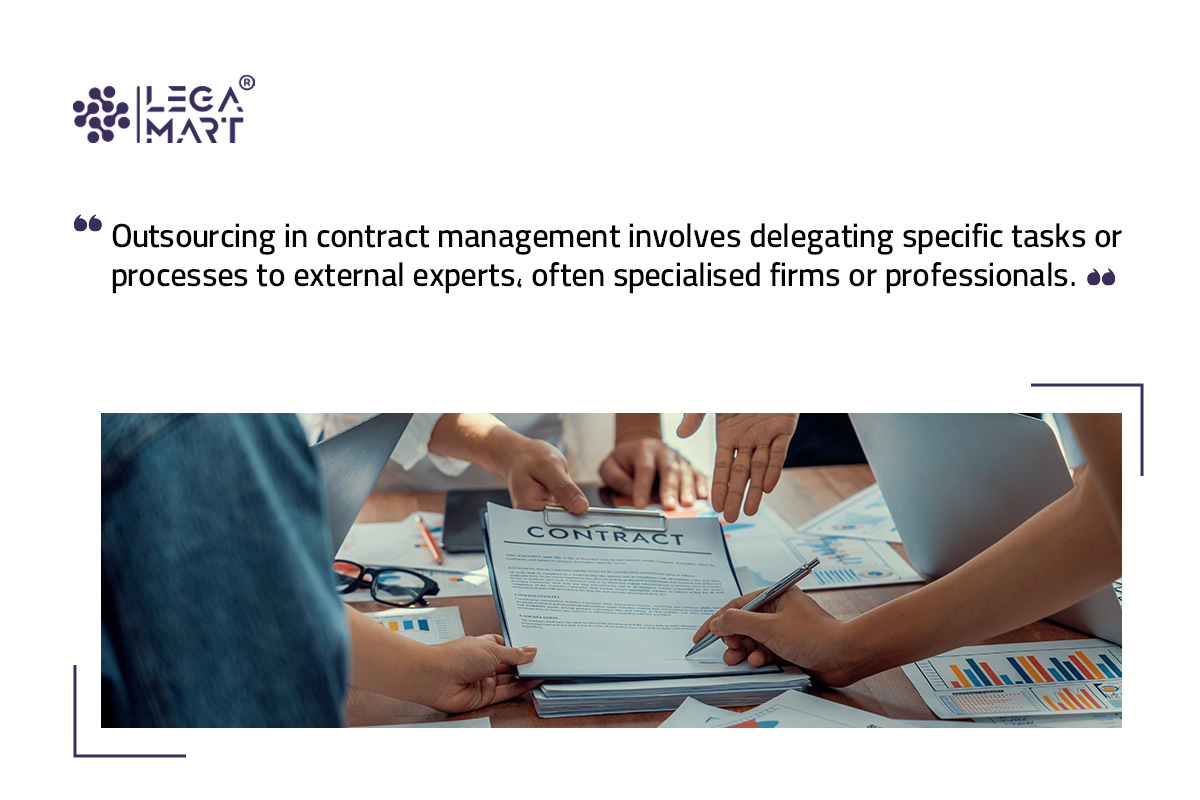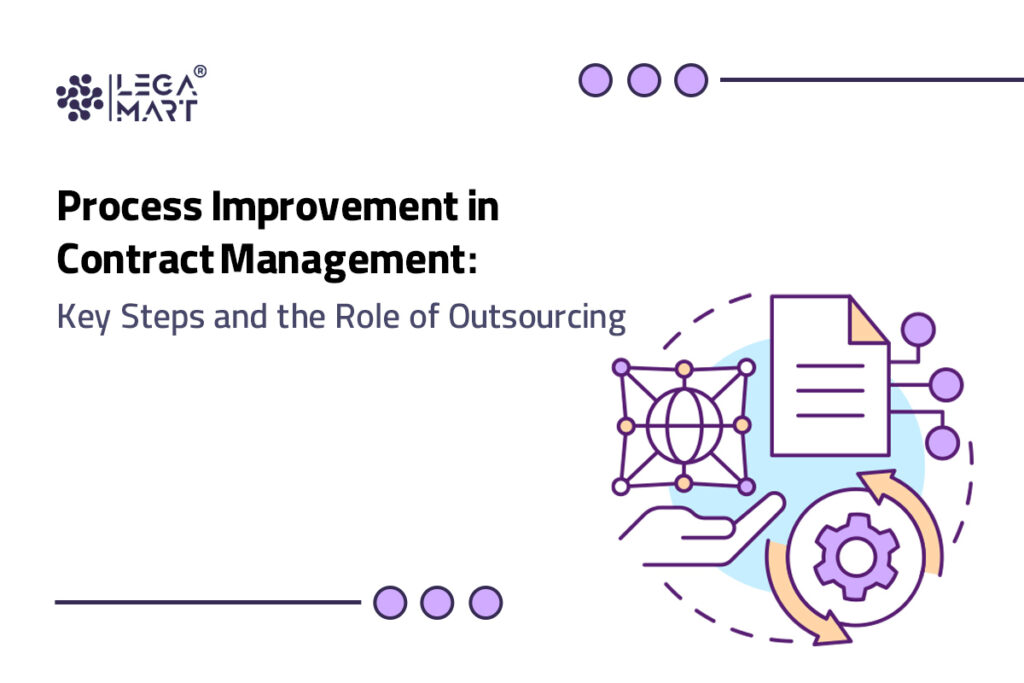In the ever-evolving landscape of business, effective contract management is paramount to success.1 As organizations grapple with increasing complexities in their contractual relationships, the need for streamlined and efficient processes becomes imperative.2 This article, falling under the category of Legal Practice & Specialization, explores the nuances of process improvement in contract management, delving into key steps organizations can take to enhance their practices. Additionally, we will unravel the role of outsourcing in optimizing contract management workflows, providing a comprehensive guide for business leaders and legal professionals.
I. Understanding Contract Management
A. The Significance of Effective Contract Management
Effective contract management is the linchpin of successful business relationships, providing the foundational structure that outlines the rights, obligations, and expectations of all parties involved. Contracts are the cornerstone upon which transactions, partnerships, and collaborations are built. Recognising the profound significance of effective contract management is not merely a matter of administrative efficiency; it is a strategic imperative for the sustained growth and stability of organisations.
Inefficient contract management processes have far-reaching consequences, permeating every facet of business operations. Disputes from poorly managed contracts can escalate into costly legal battles, draining resources and damaging reputations. Missed opportunities can hinder organisational growth, whether in terms of potential collaborations or favourable terms. Financial losses, often stemming from contractual ambiguities or non-compliance, underscore the critical need for organisations to prioritise and refine their contract management practices.
The strategic importance of effective contract management extends beyond risk mitigation. A well-executed contract management framework enhances operational transparency, fosters trust among stakeholders and provides a solid foundation for strategic decision-making. Organisations that recognise contracts as more than mere legal documents understand that refining their contract management practices is not just a proactive measure; it is a strategic investment in the overall health and longevity of the business.
B. Challenges in Contemporary Contract Management
The contemporary business environment introduces a myriad of challenges to the realm of contract management, necessitating innovative solutions to stay ahead. One of the prominent challenges arises from the complexities inherent in global transactions. According to a recent study by the International Association for Contract and Commercial Management (IACCM), 63% of businesses consider managing cross-border contracts as a significant challenge. The intricacies of varying legal frameworks, languages, and cultural nuances amplify the difficulty of overseeing contracts on a global scale.
Another noteworthy challenge stems from the escalating volume of contracts that organisations must contend with. The IACCM’s research indicates that 72% of businesses are dealing with increasing contracts year over year. The surge in contract volume brings with it the risk of information overload, making it challenging to track, analyse, and manage each contractual agreement effectively.
In response to these challenges, organisations must embrace innovative solutions that leverage technology, automation, and strategic collaboration. Identifying and addressing these contemporary hurdles is the pivotal first step toward achieving meaningful process improvement in contract management. It requires a holistic approach that combines legal acumen, technological advancements, and a proactive mindset to successfully navigate the complexities of the modern business landscape.
II. Key Steps in Process Improvement

A. Conducting a Comprehensive Contract Review
At the heart of any effective contract management strategy lies a comprehensive contract review. This foundational step is akin to a diagnostic check-up for an organisation’s contractual health. It involves meticulously examining existing contracts to unearth potential bottlenecks, inconsistencies, and areas ripe for improvement. Legal professionals and business leaders must form a collaborative alliance during this phase, pooling their expertise to ensure a nuanced understanding of contractual obligations and opportunities.
The comprehensive contract review is a proactive measure to identify potential risks, ambiguities, or outdated terms that may lurk within the contractual framework. It is a compliance exercise and a strategic initiative to fortify the organisation against future challenges. Authentic statistics, such as those derived from the International Association for Contract and Commercial Management (IACCM), indicate that 78% of businesses recognise contract review as critical to mitigating risks and ensuring compliance.
B. Implementing Automation and Technology Solutions
In the dynamic landscape of contract management, integrating automation and technology solutions emerges as a transformative catalyst for efficiency and accuracy. This step transcends traditional manual processes, offering organisations a streamlined approach from contract creation to tracking and compliance monitoring.
Authentic case studies and real-world examples are instrumental in illuminating the success stories of organisations that have embraced technology to enhance their contract management workflows. According to a survey by Deloitte, 93% of businesses reported an improvement in contract management efficiency after implementing technology solutions. We will delve into these cases, exploring how technology reduces the manual workload and significantly enhances accuracy and compliance.
The implementation of technology encompasses various facets, from Artificial Intelligence (AI) aiding in contract analysis to Contract Lifecycle Management (CLM) systems providing a centralised repository. By leveraging automation tools, organisations can not only mitigate the risks associated with human error but also free up valuable resources, allowing legal professionals to focus on strategic initiatives.
C. Enhancing Collaboration and Communication
Smooth collaboration and communication lay the groundwork for effective contract management. In this step, the emphasis is on breaking down silos and fostering open communication channels between legal teams, procurement, and other relevant departments. The importance of collaborative tools cannot be overstated, as they enable real-time information sharing and seamless interaction.
D. Developing Standardized Processes and Templates
In the intricate landscape of contract management, the establishment of standardised processes and templates emerges as a cornerstone for consistency and efficiency. Standardisation ensures that contractual documents follow a predefined structure, reducing the likelihood of errors and discrepancies. By delving into practical insights and best practices from organisations that have successfully implemented standardised processes, we can uncover the transformative impact of this key step.
Developing standardised processes involves creating a framework that guides the drafting, review, and execution of contracts. This framework not only facilitates a more streamlined workflow but also safeguards against oversights and inconsistencies. Authentic statistics reveal that organisations with standardised contract management processes experience a 25% reduction in contract lifecycle times, according to a survey by the Contract Management Institute.
Templates, when aligned with standardised processes, provide a consistent format for various types of contracts, ensuring that crucial elements are systematically addressed. We will explore case studies where organisations have implemented standardised templates, showcasing how this approach contributes to efficiency gains and risk mitigation. Through practical examples, businesses can glean insights into tailoring standardised processes to their unique needs, achieving a harmonious balance between flexibility and uniformity.
E. Investing in Continuous Training and Skill Development
Recognising the dynamic nature of business and law, continuous training and skill development are integral to an effective contract management strategy. The importance of ongoing education for professionals involved in contract management cannot be overstated. We will delve into the nuances of this step, emphasising the critical role it plays in adapting to evolving legal landscapes and staying ahead of industry trends.
Investing in continuous training programs is not merely a checkbox for compliance; it is a strategic initiative that empowers legal teams with the latest knowledge and skills. Successful training programs not only enhance contract management capabilities but also contribute to a culture of continuous improvement within organisations. Authentic case studies will be explored, shedding light on how organisations have reaped the benefits of investing in their teams’ skill development, resulting in heightened efficiency and adaptability.
By embracing a commitment to continuous learning, legal professionals can navigate the complexities of ever-evolving legal requirements, ensuring that their contract management practices remain compliant and cutting-edge. This step is not just about staying current; it’s a proactive measure that positions organisations to thrive amid change, equipping their teams with the tools needed to face the challenges of tomorrow.
III. The Role of Outsourcing in Contract Management

The realm of contract management has witnessed a paradigm shift with the emergence of outsourcing as a strategic option. This section provides a comprehensive overview of outsourcing in contract management, elucidating the types of tasks that can be outsourced and the potential benefits organisations can accrue.
Outsourcing in contract management involves delegating specific tasks or processes to external experts, often specialised firms or professionals. This approach allows organisations to tap into external expertise, optimise resource allocation, and focus on core business functions.
The decision to outsource contract management processes comes with many benefits and challenges. On the positive side, outsourcing can offer substantial cost savings, access to specialised skills and expertise, and scalability to handle fluctuating workloads. According to a study by Deloitte, organisations that outsource their contract management processes experience an average cost reduction of 15%.
However, outsourcing is not without its challenges. Concerns about data security, quality control, and maintaining a cohesive organisational strategy can pose potential pitfalls. This part of the article will delve into both the advantages and challenges of outsourcing in contract management, offering a balanced perspective to guide organisations contemplating this strategic option.
Real-world case studies provide insight into the tangible benefits of outsourcing in contract management. By examining organisations that have successfully leveraged outsourcing partnerships, we can glean valuable lessons on how this strategic approach contributes to enhanced efficiency, reduced costs, and increased overall effectiveness in contract management.
Case studies will spotlight diverse industries and scenarios, illustrating the versatility of outsourcing solutions. Organisations that have navigated challenges successfully and capitalised on the advantages of outsourcing will be showcased. These examples will serve as inspiration for businesses contemplating outsourcing, offering a roadmap for establishing fruitful partnerships and achieving strategic goals.
Conclusion
Achieving process improvement in contract management is a multifaceted journey that involves understanding the challenges, implementing key steps, and considering strategic options such as outsourcing. By following the insights and real-world examples presented in this article, organisations can embark on a transformative path toward more efficient and effective contract management. As the business landscape continues to evolve, mastering contract management becomes a strategic advantage and a crucial element in fostering long-term success and resilience.
As you navigate the complex terrain of contract management, Legamart stands ready to empower your organisation with cutting-edge solutions. Elevate your contract management processes by leveraging Legamart’s innovative platform, where technology meets expertise. From standardised processes to continuous skill development and strategic outsourcing, Legamart offers a comprehensive suite of tools to enhance efficiency and mitigate risks. Take the next step in optimising your contract management journey—explore Legamart’s transformative solutions today and elevate your business to new heights of success. Your contracts and our commitment—are seamless, efficient, and future-ready.




